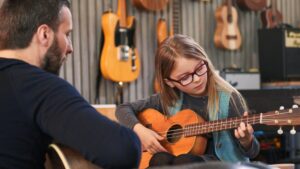One of the biggest questions we get from parents is: how much say should kids have in choosing musical instruments? As music teachers who work closely with beginners, we’ve seen firsthand how a child’s involvement in this decision can significantly impact their motivation and long-term success.
Why Choice Matters for Motivation
When children are given some ownership over their learning journey, they’re more engaged, motivated, and confident. Research from Frontiers in Psychology supports this: autonomy-supportive environments improve children’s executive functioning and persistence. So, letting your child help choose their instrument—within boundaries—can foster a lasting love for music.
Smart Ways to Involve Your Child
Giving kids a role in picking their instrument doesn’t mean handing over the decision completely. Here’s how we recommend balancing guidance with empowerment:
- Offer a Limited Set of Choices
Pick two or three instruments that are age-appropriate and accessible. Let your child explore them with sound samples or short demos. - Have an Honest Conversation
Discuss the practical side: practice requirements, size, cost, and sound preferences. Then ask your child what they’re most drawn to—and why. - Try Before You Commit
Many rental programs allow you to test an instrument before purchasing. A few trial lessons can help confirm if it’s the right fit.
When to Take the Lead
Sometimes adult guidance should outweigh preference:
- The child’s hands or lungs aren’t developed enough for certain instruments
- Budget or access limitations rule out certain options
- The chosen instrument doesn’t align with the child’s learning style
Still, even in these cases, involve your child in discussing alternatives.
FAQs
Q: Should kids pick their own instrument?
A: Ideally, yes—with support. Narrow the choices and let them decide between a few suitable options.
Q: What if my child loses interest?
A: Revisit the decision together. Sometimes, switching instruments reignites motivation without abandoning music entirely.
Q: Does choice really impact learning?
A: Yes. When kids participate in choosing musical instruments, they take more ownership, leading to greater commitment and enjoyment.
Realistic Expectations and Next Steps
In our years of teaching, we’ve seen how kids choosing musical instruments with some degree of independence leads to higher enthusiasm and better retention. Let them have a say—but frame the choice around what’s best for their growth.
We cover more about finding the right instrument in our post on how to choose a musical instrument for your child.
And for broader insights on the psychology of student choice, we recommend this article from Edutopia, which outlines the benefits of autonomy in education.
Get Started with Lessons In Your Home
Contact us today to find out more about our teachers and lessons. We provide lessons for many different types of instruments, and we’re happy to talk with you and to discuss what instrument you and your child should pick up!
